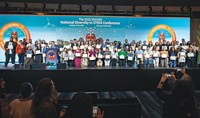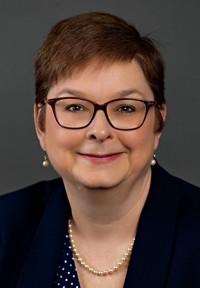Advertisement
Grab your lab coat. Let's get started
Welcome!
Welcome!
Create an account below to get 6 C&EN articles per month, receive newsletters and more - all free.
It seems this is your first time logging in online. Please enter the following information to continue.
As an ACS member you automatically get access to this site. All we need is few more details to create your reading experience.
Not you? Sign in with a different account.
Not you? Sign in with a different account.
ERROR 1
ERROR 1
ERROR 2
ERROR 2
ERROR 2
ERROR 2
ERROR 2
Password and Confirm password must match.
If you have an ACS member number, please enter it here so we can link this account to your membership. (optional)
ERROR 2
ACS values your privacy. By submitting your information, you are gaining access to C&EN and subscribing to our weekly newsletter. We use the information you provide to make your reading experience better, and we will never sell your data to third party members.
Comment
Advancing the ACS core values of DI&R through partnerships
by Dorothy J. Phillips, ACS Director-at-Large
June 5, 2020
| A version of this story appeared in
Volume 98, Issue 22

“We are all in this together”—that is the overarching theme in response to COVID-19.
A similar tagline seems appropriate for ACS’s drive to reimagine a more diverse and inclusive society. Our mandate is to advocate for those underrepresented in the chemical enterprise. To this end, partnering with organizations that focus on these specific communities of scientists opens a path to being more inclusive. This is especially important in the wake of the killing of George Floyd as it shines a light on the inequality experienced by these diverse communities.
ACS now works with four professional scientific organizations: the National Organization for the Professional Advancement of Black Chemists and Chemical Engineers (NOBCChE), the Society for Advancement of Chicanos/Hispanics and Native Americans in Science (SACNAS), the American Indian Science and Engineering Society (AISES), and the National Organization of Gay and Lesbian Scientists and Technical Professionals (NOGLSTP). These organizations provide best practices and role models for embracing the underrepresented population of scientists.
C&EN has made this story and all of its coverage of the coronavirus epidemic freely available during the outbreak to keep the public informed. To support our journalism, become a member of ACS or sign up for C&EN's weekly newsletter.
A group of African American chemists and chemical engineers organized NOBCChE in 1972 with the mission “to build an eminent cadre of successful, diverse, global leaders in STEM [science, technology, engineering, and mathematics] and advance their professional endeavors by adding value to their academic development, leadership, and philanthropic endeavors throughout their careers.” Emanuel Waddell, immediate past president of NOBCChE, shared the following at the 2018 NOBCChE conference: “Chemistry is what binds all of us together but NOBCChE fully embraces the challenges of race and gender, the balancing of professional and personal lives, the need of scientists to be uplifted to overcome challenges and overcome stumbles on the path to success.”
For more than 46 years, SACNAS has been dedicated to fostering the success of Chicano/Hispanics and Native Americans in attaining advanced degrees, careers, and positions of leadership within STEM. SACNAS holds the largest multidisciplinary, multicultural STEM-diversity event in the country—the National Diversity in STEM Conference, “which serves to equip, empower, and energize participants for their academic and professional paths in STEM.”
Founded in 1977, AISES is a national nonprofit organization “focused on substantially increasing the representation of American Indians, Alaska Natives, Native Hawaiians, Pacific Islanders, First Nations, and other indigenous peoples of North America in STEM studies and careers.” The AISES National Conference has become “the premier event for indigenous STEM professionals and students, attracting over 2,000 members and attendees from the US and Canada.”
NOGLSTP, founded in 1983, is a professional society whose mission is to “empower lesbian, gay, bisexual, transgender, and queer individuals in STEM by providing education, advocacy, professional development, networking, and peer support.” One way that NOGLSTP provides support is through its Out to Innovate Summit, which offers “career development and enrichment for LGBTQ+ students, academics, and career professionals in the STEM fields.”
In 2010, ACS President Joseph Francisco signed a Memorandum of Understanding (MOU) with SACNAS, ACS’s first partnership agreement. That partnership was renewed in 2019. NOBCChE and ACS signed an MOU in 2016, and an updated partnership agreement is in process for 2021.
These organizations now interact on a regular basis with ACS, and act as liaisons to the Diversity, Inclusion, and Respect (DI&R) Advisory Board, which is chaired by Natalie LaFranzo. The DI&R Advisory Board is tasked with helping the ACS Board of Directors and the Standing Committee on Professional and Member Relations implement the society’s core values of diversity, inclusion, and respect. Joint membership programs are being explored which would enable reciprocal sharing of resources between organizations.
Another example of a successful partnering initiative is the ACS Bridge Program, developed in collaboration with NOBCChE. The ACS Bridge Program is sponsored by the US National Science Foundation and Genentech and is aimed at increasing the number of chemical science PhDs awarded to underrepresented minority students. The program creates a bridge to a national network of doctoral-granting institutions that provide substantial mentoring for students to successfully complete PhD programs. The related ACS Bridge Travel Award and the ACS Partner Society Travel Award are specifically targeted to students at our partner scientific organizations, providing funds for students to travel to a NOBCChE and/or ACS National Meeting.
ACS seeks to supplement, not supersede, the long-standing ties that underrepresented scientists have with the aforementioned organizations. Enhancing the ACS connection to these scientists and these organizations will enable ACS to move toward its goal of increasing and serving underrepresented chemists and chemical engineers.
Together we will move toward an ACS that fully realizes its core values of diversity, inclusion, and respect. I invite your ideas and feedback at d.phillips@acs.org.
Views expressed are those of the author and not necessarily those of C&EN or ACS.




Join the conversation
Contact the reporter
Submit a Letter to the Editor for publication
Engage with us on Twitter